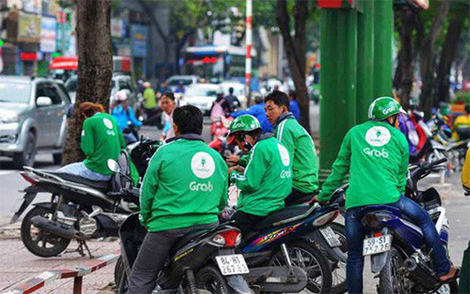 Economy
Economy


|
| Grab is a typical model of sharing economy. — Photo vccinews.vn |
HÀ NỘI — A sharing economy project was approved on Monday to ensure an equal business environment among enterprises in the sharing economic model and traditional companies.
Prime Minister Nguyễn Xuân Phúc issued a decision to approve the project.
The project aims to ensure the rights, responsibilities and benefits of parties participating in the sharing economic model, including service providers, users and platform providers.
At the same time, the project encourages innovation, the application of digital technology and the development of the digital economy.
According to the Ministry of Planning and Investment (MPI), a sharing economy is a new business model which takes advantage of technology to cut costs and reach customers through digital platforms.
The sharing economy model has developed in recent years around six major sectors, including transportation, room sharing, e-commerce, employment, financial services and online advertising.
Ride-sharing firm Grab is a typical example of a company in the sharing economy.
The project is to support and adapt to the new development trend of the shared economic model in the context of the rapid development of digital technology in the world.
It is unnecessary to have separate policies for a shared economic model of business because economic sharing is not an integral part or a separate economic component in the economy.
The state management should change mindset and management methods to suit the development of the digital economy and the Fourth Industrial Revolution. Meanwhile, the awareness of localities, businesses and people on sharing economy should be improved.
The decision said the MPI would take charge of working with ministries and sectors in amending and completing the current legal and policy system to meet the requirements on the management of the activities of the sharing economy.
Meanwhile, the Ministry of Finance is assigned to apply new technologies to tax policy implementation and management.
The Ministry of Transport will have to review and abolish unsuitable regulations on business conditions regarding traditional transport business while supplementing some necessary conditions on services in the sharing economy.
The project also requires the Ministry of Industry and Trade to study and develop policies to promote sharing economic models to boost sustainable production and consumption, proposing policies for e-commerce development applying sharing economic models.
The Ministry of Information and Communication should study cross-border information technology services to propose in negotiations of integration commitments while supplementing documents relating to information and technology in the upcoming time.
The State Bank of Viet Nam will build regulations relating to cross-border transactions through payment gates granted licences by the central bank.
The Ministry of Culture, Sport and Tourism will study regulations on condotels and officetels.
The Ministry of Science and Technology will review the legal system on State management on science and technology as well as innovations relating to sharing economy.
The decision took effect from Monday.
Earlier, the MPI said in Viet Nam, the sharing model had not developed strongly but had potential.
According to the ministry the sharing economy has advantages of increasing tax revenue for the State budget, contributing to efficient use of resources and environmental protection. In addition, consumers have more choices of services and products while encouraging enterprises and individuals to improve service quality and create competition to promote the development and restructuring of management in production and business. — VNS




